Places to Visit
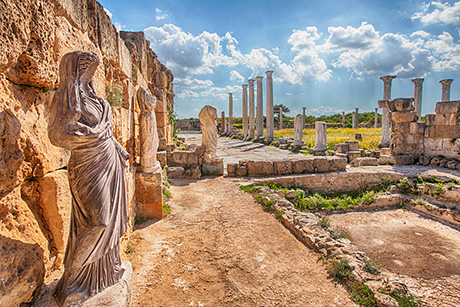
SALAMIS RUINS
The ancient city of Salamis was founded by Tefkros in the Bronze Age located to the north of Gazimağusa. The earliest findings at the ancient city date back to 11th century BC. The Salamis Ancient City was discovered with excavations carried out between 1952-1974 and is one of North Cyprus’ most important sites to visit. The ruins of the gymnasium, the baths, the forum and the agora which one can see whilst visiting the ancient city are all from the Roman Period.
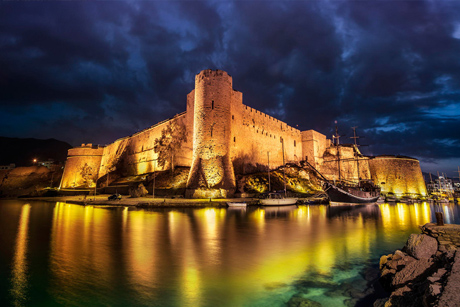
KYRENIA CASTLE
Situated next to the Kyrenia Harbour, the Kyrenia Castle is a complicated mixture of building styles worth visiting in North Cyprus. Behind the venetian castle walls you will find chruch of St George, royal apartments, byzantie chappel or French dungeons. The ship in the Shipwreck museum is estimated to have sunk around 300BC and is, to date, the oldest ship ever to be recoverd from the seabed.

KARPAZ GATE MARINA
The first modern marina in North Cyprus, Karpaz Gate Marina offers a luxurious experience in a unique, unspoilt location. The 5 Gold Anchor-rated marina has been designed to specifically cater for superyachts, offering premier leisure and technical facilities. There are plenty of incentives to stay on-site at the marina and take advantage of the restaurant and outlets along the Promenade.
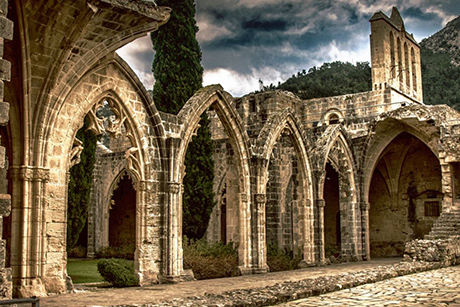
BELLAPAIS ABBEY
The Medieval Bellapais Abbey is located at the foot of the Beşparmak (Five Finger) Mountains to the east of Girne where it fascinates visiting tourists from all over the world with its unique gothic styled architecture and astonishing scenery. The world famous English author Lawrence Durell, who wrote his book the “Bitter Lemons” whilst living in Bellapais Village between 1953-1956, constantly mentioned his admiration for the abbey. The house in which he lived in next to the abbey, also attracts many visitors.
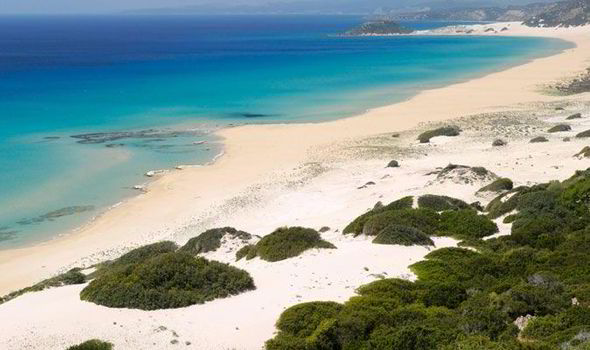
GOLDEN BEACH IN KARPAZ
The wonderful Golden Beach is one of the Mediterranean Sea’s virgin beaches; it stretches 2 km along the Karpaz Peninsula with its clear blue water and golden sandy shoreline. All along Golden Beach you will have the captivating opportunity of walking bare footed for kilometres and refreshing yourself by taking a dive into the cool blue waters.
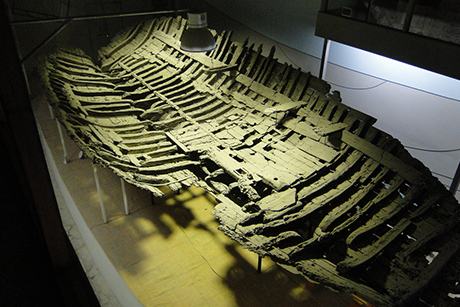
SHIPWRECK MUSEUM
Located within Kyrenia Castle, the Shipwreck Museum displays a cargo boat which sank just off Kyrenia some 2300 years ago. It was discovered by a local sponge diver over 30 metres down in 1965, and was salvaged between 1967 and 1969 by marine archaeologists from the Pennsylvania University. It is the oldest shipwreck known, and carbon 14 dating indicates it was built in 389BC, around the time of Alexander the Great.
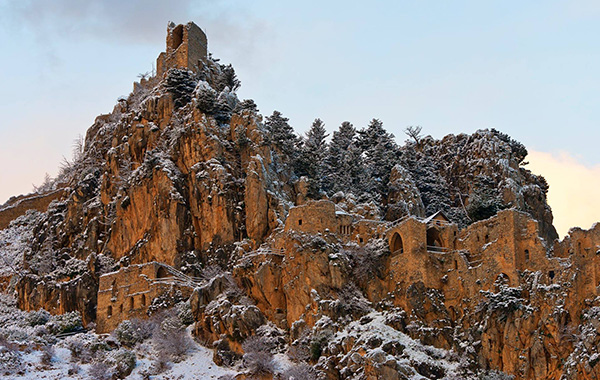
ST. HILARION CASTLE
St. Hilarion Castle is one of the three castles set upon the Beşparmak (Five-Finger) Mountains and is located towards the west of the mountains at a height of 700 meters from sea level. In the 10th century a monastery and a church were added to the castle, which was named after a saint who migrated from Jerusalem to Cyprus and spent the last years of his life praying there. It is said that, the famous Walt Disney was also inspired by the St. Hilarion Castle and that the location of the renowned cartoon “Snow White and the Seven Dwarfs” was based in this Castle.
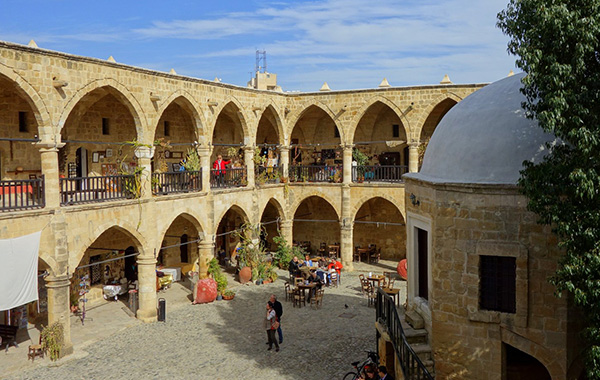
THE GREAT KHAN
It is not only Nicosia’s, but one of the island’s most important Ottoman works of architecture. It was built between 1572-1579 as a two storied, square planned building with Bursa’s Koza Khan taken as an example. The Khan consists of a total of 68 rooms, where the rooms on the ground floor were used as shops of commerce and the rooms on the top floor were used as hotel rooms. The building is now used as an entertainment and travelling centre where handcrafts and souvenirs are sold.
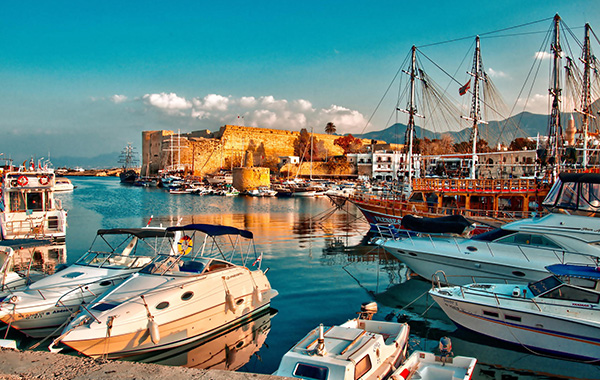
KYRENIA HARBOUR
Kyrenia, with its picturesque harbour and adjacent castle is called the “Jewel of Cyprus”. It is simply exquisite! The horseshoe shaped historical Kyrenia Harbour, which was built at the centre of the city, is most definitely one of the first places to visit in Kyrenia. The colourful fishing boats and yachts anchored at the harbour make it a favourite attraction for locals as well tourists to visit. The harbour is surrounded by restaurants and bars that have been developed from buildings that were once Venetian dwellings or carob warehouses.
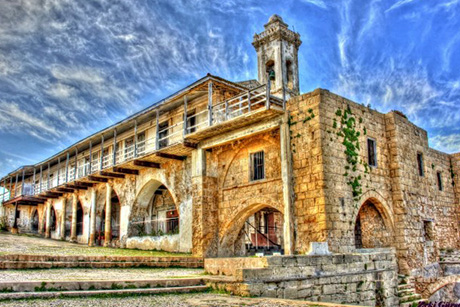
KARPAZ PENINSULA AND APOSTOLOS ANDREAS MONASTERY
The Karpaz Peninsula or “panhandle” as the British called the north-east part of Cyprus is a land where time stands still. There are miles of sandy Karpaz beaches with not a person in site. Ancient towns, basilicas, ruins and tombs scatter the area waiting to be explored. Situated at the tip of the peninsula is Apostolos Andreas Monastery, dedicated to St Andrew, the miracle worker. Karpaz is also know for its wildlife including wild donkeys.
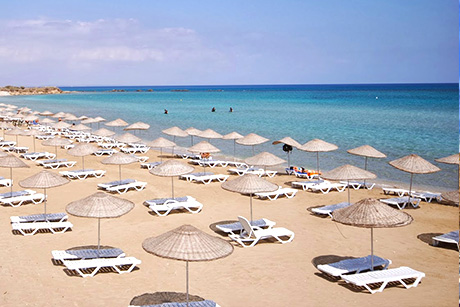
GALPSIDES BEACH
Glapsides Beach in Famagusta has everything you could want from a beach. It has white sand, crystal clear waters and a coastline that extends kilometers away. The beach is open to the public, and there is a restaurant, pedal boats, jet skis, pedaloes, deck chairs and showers. The beach restaurant and bar is lively, with a resident dj. It's also a great place to bring the kids, as the water is shallow and the sea calm.
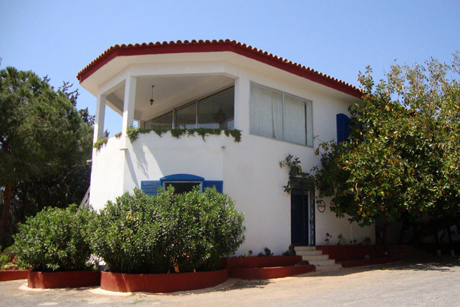
MAVİ KÖŞK (BLUE MANSION)
Mavi Köşk (Blue Mansion) was built in 1973 by Byron Pavlides, a Greek Cypriot entrepreneur and man of great mystery. The villa has 16 rooms on two floors and represents a mixture of Greek, Italian, Turkish and Eastern Mediterranean styles. It was built using the most up to date building techniques at the time. In fact, there are several secret tunnels leading from the house to a bunker. What make sıt so ınterestıng are the myths and secrets about the the property and its rooms.
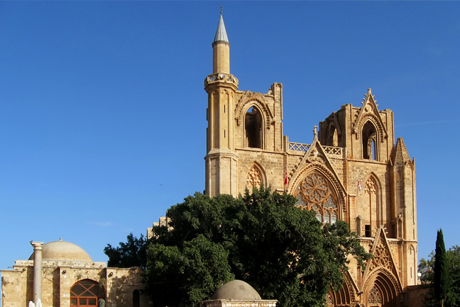
OLD CITY OF FAMAGUSTA
Famagusta is a beautiful characteristic Mediterranean town with a rich history and its old and modern buildings. It is superbly ideal for a sightseeing tour. Once through the imposing gateway of the old walled city of Famagusta you leave behind the hustle of the modern commercial city and enter an open air museum. The jewel here is the old St Nicholas Cathedral which is still in use today as the Mustafa Pasa Mosque. Lusignan kings were crowned here in absentia as kings of Jerusalem after they had been crowned as kings of Cyprus in Nicosia. The thick, heavy Venetian walls of the Old City offer ramparts for walking, especially the section looking seaward surrounding the Sea Gate. St Mark’s lion, the statue near the Sea Gate, leaves no doubt of the Venetian presence and Othello’s Tower nearby owes its name to Shakespeare. Amongst historical buldings you will find a pedestrianized shopping street in the heart of the city to serve your needs and a good number of cafés and restaurants.
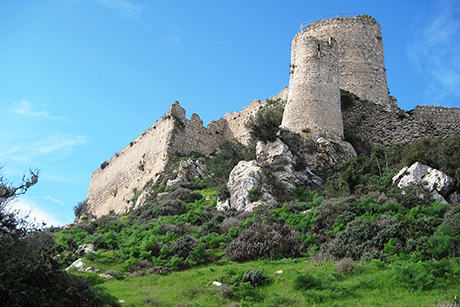
KANTARA CASTLE
The Kantara Castle is the easternmost of the castles situated on the Girne Mountains, at a height of 700 meters from sea level. The castle has a strategic advantage, as it overlooks the northern shoreline, the Mesarya Plains and the Karpaz Peninsula. Although the upper floors were removed hundreds of years ago, there are still the lower rooms of the guard house, Castellan’s apartments, barrack rooms and on the western side of the castle there are vast storerooms and deep cisterns. Following the line of the perimeter walls will reveal scant remains of further dwellings and there are breathtaking views at every turn. Not to be missed is the north east tower, that contains a long room, equipped with tall arrow slits that permitted archers armed with longbows to fire on the enemy below and yet remain relatively protected themselves. A walk around Kantara should not be hurried for this is the castle of a hundred and one rooms, and according to legend anyone who finds the 101st will enter Paradise!
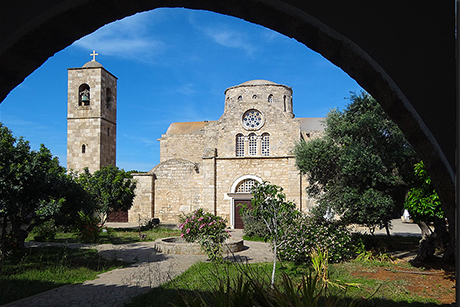
ST. BARNABAS MONASTERY
The Saint Barnabas Monastery is located near Tuzla Village, Famagusta. Barnabas lived in ancient Salamis, and he preached the gospel message throughout Cyprus, particularly in Salamis around 45 AD. In 477, a monastery, financed by Byzantine Emperor Zeno, was built near the apostle Barnabas' grave, which is situated on the western end of the Salamis Necropolis and near the Royal Tombs. Two centuries after the Saint Barnabas Monastery was built, it was destroyed during a raid, and only the foundation of the original building still remains. The St. Barnabas Monastery that is on site today is from the 1750’s. Today, the Saint Barnabas Monastery serves as a historical site with two museums: Archaeological Museum and Icon Museum. The Archaeological Museum focuses on ancient artifacts from throughout the region, particularly from the Salamis Archaeological Site.The Icon Museum includes various icons, particularly from the 18th century, gathered from the village churches throughout the Famagusta district, as well as from the Saint Barnabas Monastery.
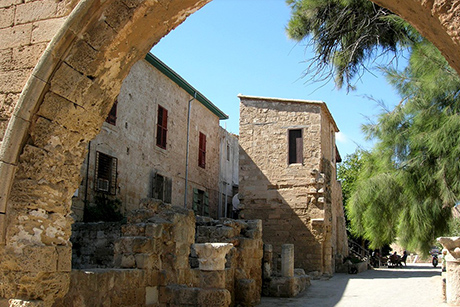
NAMIK KEMAL DUNGEON
The dungeon is situated in the courtyard of the Venetian Palace and has been constructed with ashlar. Namik Kemal, playwright and poet, stayed in this building for 38 months during his exile in Cyprus because of a play he had written criticizing the Ottoman rulers. The ground floor has a door opening to the courtyard of the palace and a window with grating. A steep ashlar staircase leads to the room on the upper floor in which documents belonging to Namik Kemal are being exhibited. This room has two windows.